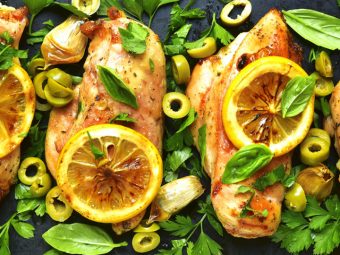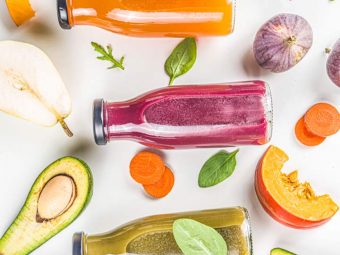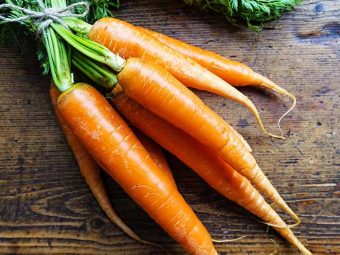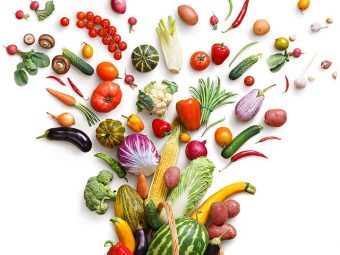8 Home Remedies To Treat Food Poisoning + Causes And Prevention
Treat your upset stomach with simple, effective, and readily available remedies.
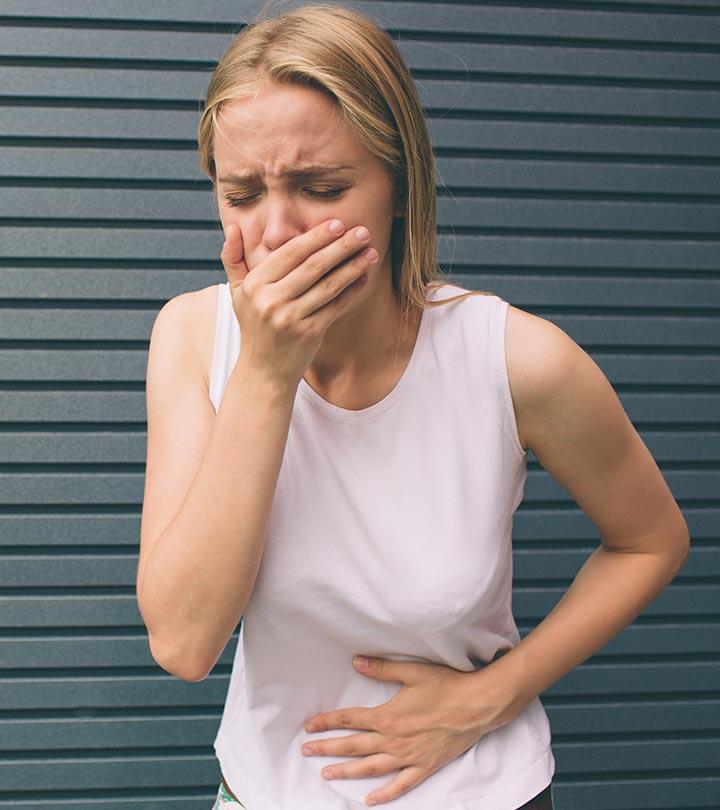
Those who love trying new food options wherever they go may have a higher risk of food poisoning. However, such an incident doesn’t have to stop experimenting with new cuisines. We are here to help you with some home remedies for food poisoning that can help you recover faster. Food poisoning is often accompanied by bouts of loose motions, nausea, vomiting, abdominal pain, and dehydration. Hence, it is important to keep yourself well-rested and hydrated till you recover. The following home remedies can possibly accelerate your recovery. Check them out.
In This Article
What Is Food Poisoning?
When you ingest contaminated, expired, or toxic food, it often leads to food poisoning, also known as foodborne illness. It is usually characterized by nausea, vomiting, and diarrhea.
Food poisoning must be treated before it turns life-threatening. If you have had food poisoning, try the remedies listed below to accelerate your recovery.
Home Remedies To Treat Food Poisoning
1. Apple Cider Vinegar
The antibacterial properties of apple cider vinegar are very effective against foodborne pathogenic bacteria like Escherichia coli (1), (2).
You Will Need
- 1-2 tablespoons of raw, unfiltered apple cider vinegar
- 1 glass of warm water
What You Have To Do
- Add one to two tablespoons of apple cider vinegar to a glass of water.
- Mix well and consume immediately.
How Often You Should Do This
Drink this 2 to 3 times daily.
2. Essential Oils
a. Oregano Oil
Oregano essential oil can work wonders in treating food poisoning. It contains compounds like carvacrol and thymol that impart excellent antimicrobial properties to it and help eliminate the pathogens responsible for food poisoning (3), (4).
You Will Need
- 1 drop of food-grade oregano oil
- 2 oz of water
What You Have To Do
- Add a drop of oregano oil to 2 oz of water and mix well.
- Consume this solution.
How Often You Should Do This
Drink this 1 to 2 times daily until you see an improvement in the symptoms.
b. Thyme Oil
Thyme oil contains compounds like thymol, carvacrol, and linalool that have antimicrobial and antiparasitic properties (5). Hence, it can be effective against various foodborne illnesses.
You Will Need
- 1 drop of thyme oil
- 1 glass of water
What You Have To Do
- Add a drop of thyme oil to a glass of water.
- Mix well and consume this.
How Often You Should Do This
Drink this solution 1 to 2 times daily.
3. Ginger With Honey
Ginger is a commonly used remedy for various ailments. Mice studies showed that it might be effective in supplementing the clinical treatment of E.coli diarrhea (6). Ginger can also improve the absorption of essential nutrients that can aid digestion. Raw honey exhibits antimicrobial and digestion properties that can speed up your recovery. Both ginger and honey can relieve nausea and vomiting that are the usual symptoms of foodborne illnesses (7), (8).
You Will Need
- 1 to 2 inches of sliced ginger root
- 1 cup of water
- Honey
What You Have To Do
- Add the ginger to a cup of water and bring it to a boil in a saucepan.
- Simmer for 5 minutes and strain.
- Let the tea cool a little before adding some honey to it.
- Consume it immediately.
- You can also mix a few drops of ginger juice with honey and consume it.
- As a quick fix, you may also chew on small pieces of ginger.
How Often You Should Do This
Drink this tea at least 3 times daily until your symptoms subside.
4. Garlic
Garlic has powerful antibacterial, antiviral, and antifungal properties that can help destroy the foodborne pathogens (9), (10). It can also relieve diarrhea and stomach pain.
You Will Need
2-3 peeled garlic cloves
What You Have To Do
- Chew on the garlic cloves.
- Alternatively, you can also mince some garlic and consume it with honey.
How Often You Should Do This
Consume garlic at least once daily until you obtain relief.
5. Grapefruit Seed Extract
Grapefruit seed extract contains polyphenols that help inhibit the activity and growth of bacteria causing foodborne illnesses (11). These properties fight the pathogens responsible for food poisoning and aid faster recovery.
You Will Need
- 8-10 drops of grapefruit seed extract
- 1 glass of water
What You Have To Do
- Add a few drops of grapefruit seed extract to a glass of water and mix well.
- Consume this solution daily.
How Often You Should Do This
Drink this 3 times daily for 3 to 5 days.
6. Lemon Juice
Lemon juice is a rich source of antioxidants that improve the overall healing of your body. It exhibits exceptional bactericidal activities that can help combat the bacterial pathogens responsible for causing food poisoning (12).
You Will Need
- 1/2 lemon
- 1 glass of water
- Honey (optional)
What You Have To Do
- Extract the juice from half a lemon and mix it with a glass of water.
- Add some honey for flavor and consume.
How Often You Should Do This
You can drink lemon juice 2 to 3 times daily.
7. Basil
a. Basil With Honey
Basil is an herb known to kill foodborne pathogens with its excellent antimicrobial properties (13). It can also calm your stomach and reduce the symptoms associated with food poisoning.
You Will Need
- Basil leaves
- Honey
What You Have To Do
- Crush some basil leaves and extract the juice.
- Mix a teaspoon of honey with a teaspoon of basil extract and consume immediately.
- Alternatively, you can also add a drop of basil oil to a cup of water and consume it.
How Often You Should Do This
Do this 3 to 4 times daily.
b. Holy Basil With Cardamom
The antimicrobial properties of holy basil (tulsi) help eliminate the microbes that cause food poisoning (14). The combination of tulsi and cardamom works wonders in alleviating vomiting and nausea.
You Will Need
- 3-4 holy basil (tulsi) leaves
- 1 cardamom (elaichi)
What You Have To Do
- Chew on the basil leaves along with cardamom.
- Alternatively, you can mix basil extract with cardamom powder and consume a teaspoon of it.
How Often You Should Do This
Consume this immediately after you experience the symptoms of food poisoning.
8. Vitamin C
Vitamin C is an antioxidant. Test-tube studies show that it can help eliminate bacteria and toxins from your body (15). Hence, its intake can help you manage the symptoms of food poisoning. If you do not want to take additional supplements, you can increase your consumption of vitamin C-rich foods
You Will Need
1000 mg vitamin C supplements (or as directed by your doctor)
What You Have To Do
Consume 1000 mg of vitamin C supplements after consulting your doctor.
How Often You Should Do This
You can continue taking this 3 to 4 times daily if your symptoms don’t improve after the initial treatment.
9. Bananas
Bananas form a part of the BRAT diet, which is recommended for people with diarrhea and gastroenteritis (16). They replenish the lost potassium in your body, which, in turn, re-energizes you and helps alleviate the symptoms of food poisoning.
You Will Need
Bananas
What You Have To Do
- Have a banana daily.
- You can also blend some bananas with milk and consume it daily.
How Often You Should Do This
You can do this 2 to 3 times a day.
Once you have succeeded in combating food poisoning using these remedies, you must be cautious about what you eat and drink. Here is a list of foods and drinks you can consume.
What To Eat After Food Poisoning
Do not eat or drink anything for a few hours after experiencing food poisoning symptoms like vomiting and diarrhea.
After a few hours, you can start consuming the following foods/drinks to overcome weakness:
- Sports drinks that contain electrolytes to keep yourself well hydrated. However, steer clear of drinks that contain too much sugar and caffeine.
- Broths
- Bland foods that are gentle on your stomach like bananas, cereals, egg whites, and oatmeal.
- BRAT diet that consists of bananas, rice, applesauce, and toast.
- Fermented foods like cultured vegetables and kimchi.
- Foods fortified with probiotics like yogurt.
Now that you know what to consume after you have experienced a bout of food poisoning, let us look at the foods/drinks that you need to avoid.
What To Avoid Eating When You Have Had Food Poisoning
Getting rid of the food that was the probable cause of food poisoning tops the list. Avoid eating or drinking anything that could be harsh on your stomach like:
- Alcohol
- Caffeine
- Spicy foods
- Dairy products
- Fatty or fried foods
- Nicotine
- Seasoned and processed foods
Mild to moderate cases of food poisoning can be easily treated at home if you follow the remedies and tips discussed in this article. However, severe cases might need medical attention.
Most cases of food poisoning are caused due to any of the factors listed below.
What Causes Food Poisoning?
The most common causes of food poisoning are:
- Bacteria: Salmonella bacteria are the most common cause of food poisoning, especially from foods like eggs, mayonnaise, and chicken that are not properly cooked. E. coli are also known to cause food poisoning from foods like salads. Campylobacter and C. botulinum are the other bacteria that can prove to be quite lethal.
- Viruses: Norovirus, also known as the Norwalk virus, is responsible for over 19 million cases of food poisoning every year. Other less common viruses that can cause food poisoning are sapovirus, rotavirus, and astrovirus. Hepatitis A virus can also be transmitted via food.
- Parasites: Food poisoning caused by parasites is less common but can prove to be fatal. Toxoplasma gondii is the parasite most commonly associated with food poisoning, and it is found in cat litter boxes. Parasites can remain undetected for years, but in people with weak immunity, they can lead to serious side effects. Pregnant women are at an increased risk of food poisoning by parasites.
Signs And Symptoms Of Food Poisoning
Food poisoning has the following symptoms:
- Abdominal pain or cramps
- Loss of appetite
- Fever
- Fatigue and weakness
- Headache
Food poisoning is caused by food-borne pathogens like E. coli after eating stale or toxic food. It causes symptoms like dehydration, diarrhea, abdominal pain, and fatigue. You can certainly try some home remedies to treat food poisoning as they have been proven to be effective. Ingredients like apple cider vinegar, honey, essential oils, ginger, garlic, grapefruit seed extract, and basil have neutralizing effects on bacteria, viruses, and parasites responsible for food poisoning. While undergoing these remedies, drink electrolyte drinks to keep yourself hydrated and consume bland foods (banana, egg whites) that are easy on the stomach.
Expert’s Answers For Reader’s Questions
What is the best medicine for food poisoning?
Most cases of food poisoning are mild and can be easily treated by using home remedies and keeping yourself hydrated. Use ginger or apple cider vinegar for quick relief.
How long does food poisoning last?
There are more than 250 types of food poisoning, which are caused by different factors. Hence, the duration and food poisoning recovery time depends on the cause of poisoning, the amount of contaminated food you ingested, and the severity of the symptoms. Mild cases of food poisoning usually last for a day or two.
Does food poisoning give you a fever?
Yes, mild fever is one of the symptoms of food poisoning. Severe cases of food poisoning are known to cause high fever.
16 sources
- Antibacterial action of vinegar against food-borne pathogenic bacteria including Escherichia coli O157:H7, Journal of Food Protection, US National Library of Medicine, National Institutes of Health.
https://www.ncbi.nlm.nih.gov/pubmed/9713753 - Antimicrobial activity of apple cider vinegar against Escherichia coli, Staphylococcus aureus and Candida albicans; downregulating cytokine and microbial protein expression, Scientific Reports, US National Library of Medicine, National Institutes of Health.
https://www.ncbi.nlm.nih.gov/pubmed/29379012 - Antibacterial and Antifungal Activities of Spices, International Journal of Molecular Sciences, US National Library of Medicine, National Institutes of Health.
https://www.ncbi.nlm.nih.gov/pmc/articles/PMC5486105/ - Efficacy of plant essential oils against foodborne pathogens and spoilage bacteria associated with ready-to-eat vegetables: antimicrobial and sensory screening, Journal of Food Protection, US National Library of Medicine, National Institutes of Health.
https://www.ncbi.nlm.nih.gov/pubmed/18810868 - Antimicrobial activity of plant essential oils against bacterial and fungal species involved in food poisoning and/or food decay, Roumanian Archives of Microbiology and Immunology, US National Library of Medicine, National Institutes of Health.
https://www.ncbi.nlm.nih.gov/pubmed/21462837 - Ginger and Its Bioactive Component Inhibit Enterotoxigenic Escherichia coli Heat-Labile Enterotoxin-Induced Diarrhea in Mice, Journal of Agricultural and Food Chemistry.
https://pubs.acs.org/doi/pdf/10.1021/jf071460f - Ginger in the prevention of nausea and vomiting: a review, Critical Reviews in Food Science and Nutrition, US National Library of Medicine, National Institutes of Health.
https://www.ncbi.nlm.nih.gov/pubmed/23638921 - Effect of dietary honey on intestinal microflora and toxicity of mycotoxins in mice, BMC Complementary and Alternative Medicine, US National Library of Medicine, National Institutes of Health.
https://www.ncbi.nlm.nih.gov/pmc/articles/PMC1431562/ - Investigating Antibacterial Effects of Garlic (Allium sativum) Concentrate and Garlic-Derived Organosulfur Compounds on Campylobacter jejuni by Using Fourier Transform Infrared Spectroscopy, Raman Spectroscopy, and Electron Microscopy ▿ †, Applied and Environmental Microbiology, US National Library of Medicine, National Institutes of Health.
https://www.ncbi.nlm.nih.gov/pmc/articles/PMC3147487/ - Antimicrobial properties of allicin from garlic, Microbes and Infection, US National Library of Medicine, National Institutes of Health.
https://www.ncbi.nlm.nih.gov/pubmed/10594976 - TGrape Seed Extract Inhibits the Growth and Pathogenicity of Staphylococcus Aureus by Interfering With Dihydrofolate Reductase Activity and Folate-Mediated One-Carbon Metabolism, International Journal of Food Microbiology, US National Library of Medicine, National Institutes of Health.
https://pubmed.ncbi.nlm.nih.gov/20483185 - Bactericidal activity of lemon juice and lemon derivatives against Vibrio cholerae, Biological & Pharmaceutical Bulletin, US National Library of Medicine, National Institutes of Health.
https://www.ncbi.nlm.nih.gov/pubmed/11041258 - Antimicrobial properties of basil and its possible application in food packaging, Journal of Agricultural and Food Chemistry, US National Library of Medicine, National Institutes of Health.
https://www.ncbi.nlm.nih.gov/pubmed/12744643 - Activity of Ocimum Sanctum (The Traditional Indian Medicinal Plant) Against the Enteric Pathogens, Indian Journal of Medical Sciences, US National Library of Medicine, National Institutes of Health.
https://pubmed.ncbi.nlm.nih.gov/12026506 - Vitamin C inhibits staphylococcus aureus growth and enhances the inhibitory effect of quercetin on growth of Escherichia coli in vitro, Planta Medica, US National Library of Medicine, National Institutes of Health.
https://www.ncbi.nlm.nih.gov/pubmed/23059632 - Bland Diet, StatPearls, US National Library of Medicine, National Institutes of Health.
https://www.ncbi.nlm.nih.gov/books/NBK538142/






